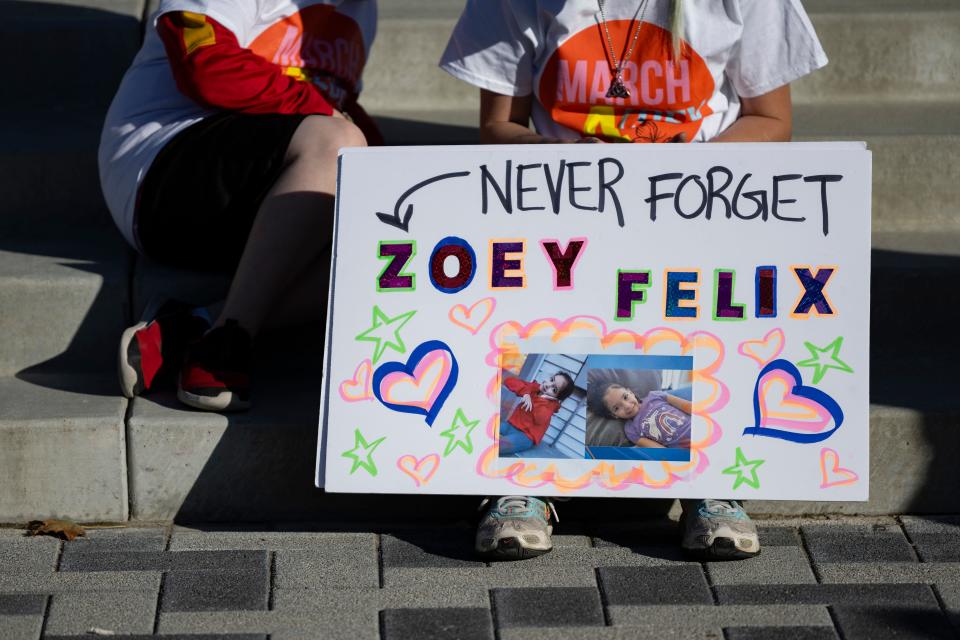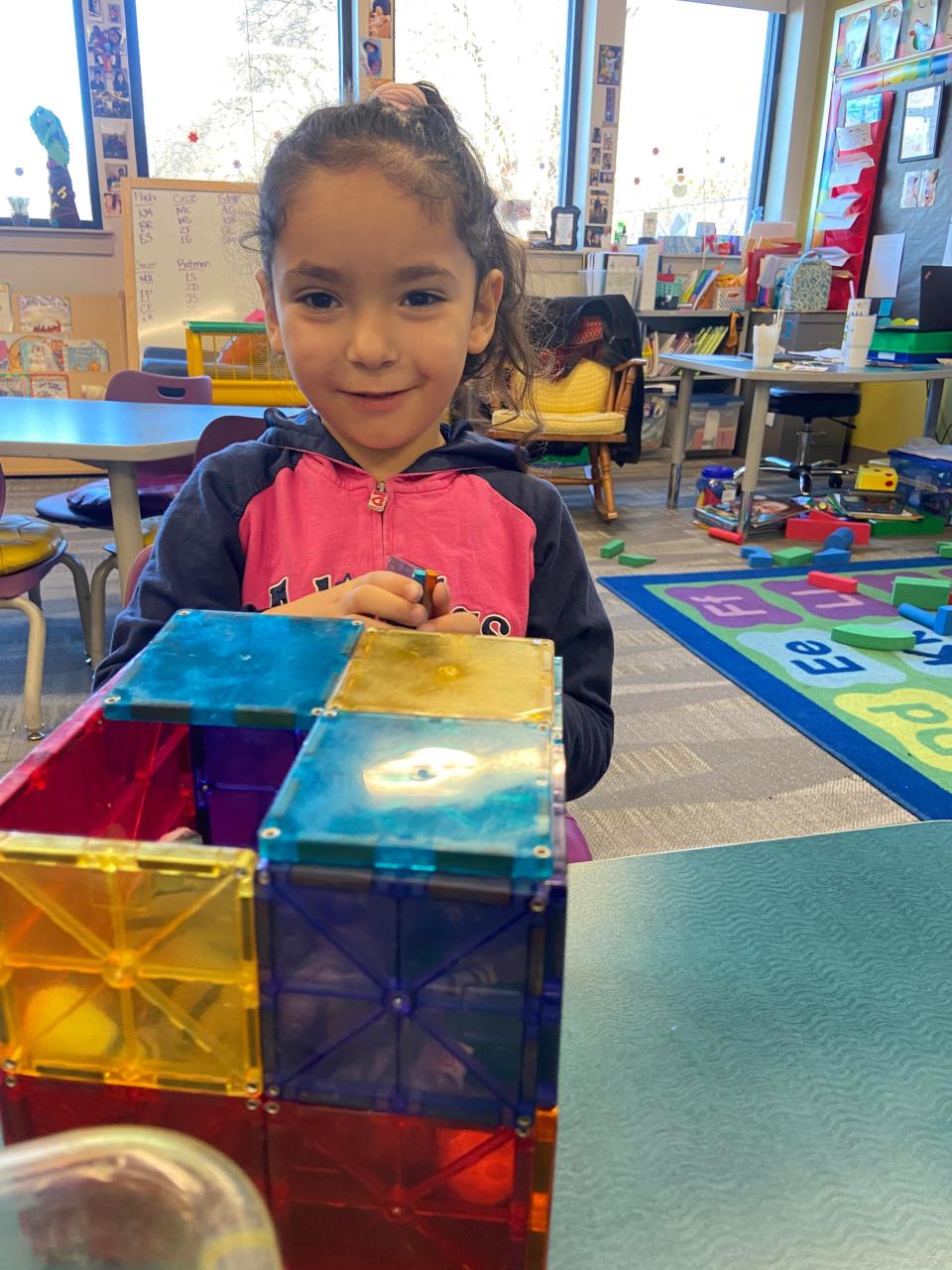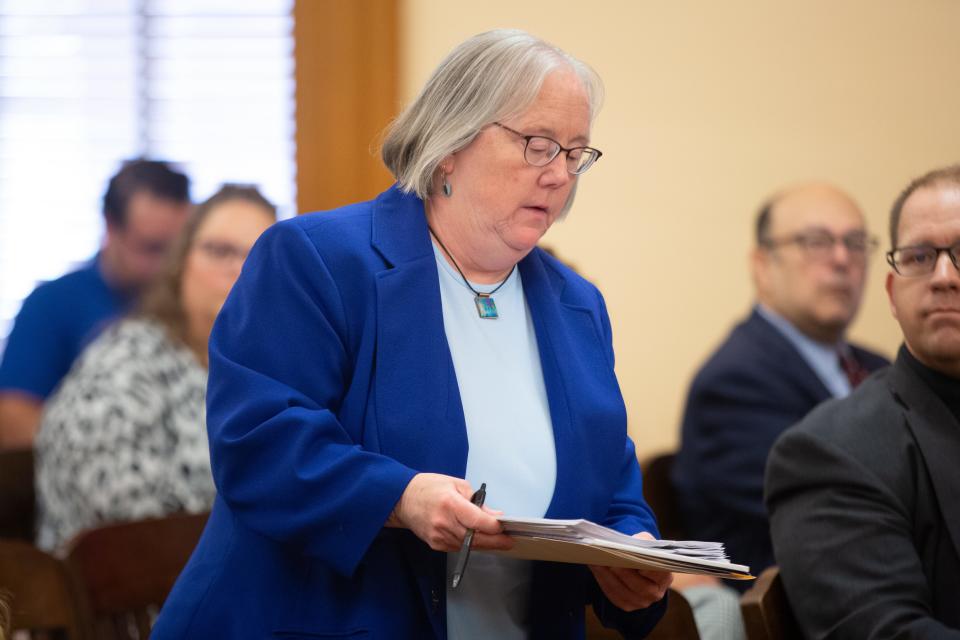We still had questions about DCF oversight of Zoey Felix's case. Here's what we found.
The death of 5-year-old Zoey Felix has raised alarms about child welfare oversight after neighbors and agencies reported concerns about her safety before she was raped and killed Oct. 2.
While Mickel Cherry has been charged with capital murder, first-degree murder and rape in Zoey's death, many are asking whether the Kansas Department for Children and Families and local authorities could have done more.
DCF issued a summary about the six times it investigated Zoey's family in the past year. That led to more questions.
Here's what we've been able to find out.
Why didn't DCF remove Zoey Felix from her home?
DCF had investigated Zoey's family six times after receiving nine reports in the past year, according to a summary released by the agency.
Prior to a report in late August, DCF had conducted four investigations. One found the mother was working with court services, and she passed a drug screen. Two cases were unsubstantiated, one for an alleged lack of supervision and one for an alleged lack of utilities and poor living conditions.
The other investigation, after the mother's DUI crash injured Zoey, was substantiated. But Zoey was left in the care of her father, Ezequiel Felix-Guerrero, after no safety concerns were identified.

"It's important to understand that DCF does not have unilateral authority to remove children from the home," said Mike Deines, DCF spokesperson. "The agency must weigh several factors when determining a child's safety, including age, living conditions, and access to resources to meet basic needs. As the summary indicated, at the time our investigators contacted the family, it was determined the home was safe, with adequate utilities and access to food. We also offered services. In this case, there was no legal basis to request removal.
"In cases where DCF determines a child is not safe in the home, we can recommend removal to the local county or district attorney. It is then up to a judge to determine if the child should become a child in need of care (CINC) and removed from the home. Again, even in that case, DCF cannot unilaterally remove children from a home."
Why isn't homelessness a reason for DCF to take custody of a child?
While DCF didn't find Zoey when she was homeless, even if it had, homelessness wouldn't have been a reason to remove her from her family.
Kansas law states that courts cannot remove a child in need of care from parental custody "based solely on the finding that the parent is homeless."
"DCF is required, under both state and federal law, to make reasonable efforts to prevent a child from entering foster care," Deines said. "Accordingly, homelessness is not in and of itself a reason to separate a child from their family and place into foster care but can be a factor in determining whether a family should be connected with community resources."
Gretchen Spiker, communications director for Topeka’s city government, on Oct. 10 said the city planned to check the campsite where Zoey and her family had stayed to see if any sanitation violations were present. The city tore down the campsite later that week after identifying sanitation concerns, she said.
What are the reasons to remove a child from his or her home?
Kansas has several laws governing both temporary and permanent removal of a child by various authorities, including how to handle police protective custody, temporary custody, child in need of care cases, removal from parental custody and termination of parental rights. Many of them use similar language and require similar findings.
For a child adjudicated to be in need of care, K.S.A. 38-2255 gives the court options. Among those options are removing a child from the custody of their parent, which first requires the court to find probable cause that:
"The child is likely to sustain harm if not immediately removed from the home."
"Allowing the child to remain in home is contrary to the welfare of the child."
"Immediate placement of the child is in the best interest of the child."
Or "reasonable efforts have been made to maintain the family unit and prevent the unnecessary removal of the child from the child's home or that an emergency exists which threatens the safety to the child."
But first, courts must follow K.S.A. 38-2234, which lays out the process for child in need of care cases and what has to be demonstrated for DCF to take custody of a child and remove them from their home.
Ultimately, courts can terminate parental rights for a child adjudicated to be in need of care if the parent is found to be unfit to properly care for the child now and in the foreseeable future. That determination is governed by K.S.A. 38-2269.
Legally, a court may consider, but is not limited to:
A parent's emotional or mental illness or physical disability.
Physical, emotional or sexual abuse or neglect.
Alcohol and drug use.
Felony conviction and imprisonment.
Unexplained injury or death of another child.
Failure to rehabilitate the family.
Lack of effort by the parent to meet the child's needs.
What happens when families refuse DCF services?
A DCF summary showed the agency offered services to Zoey's family three times: after a September 2022 investigation, after a November 2022 investigation and after a May 2023 investigation.
Each time, the family declined services, and DCF couldn't do anything about it.
"DCF has no legal authority to force families to accept services," Deines said. "Unless a court orders services once a child enters the foster care system, families have the right to decline."
Was Zoey Felix required to be in school?

Topeka Public Schools has said Zoey was a preschool student at Shaner Early Learning Academy for part of last school year, but stopped attending after spring break. She wasn't enrolled in fall 2023 classes.
"While we cannot address any details about this family, we can share that our social work team members and staff tirelessly report matters to agencies and complete home visits with the hope that intervention occurs to avoid harm to children," USD 501 officials previously said.
Zoey's absence from school wouldn't have been cause for alarm to DCF, at least not by itself.
"Any child younger than seven years old may legally be withdrawn from school at any time by a parent or caregiver with legal authority," Deines said. "Since Zoey was five, her parents retained the right to withdraw her from school."
What happens when DCF can't find a child?
The final report to DCF before Zoey's death came on Aug. 29, alleging a lack of utilities at the home. DCF tried seven times to contact the family.
They made home visits on Sept. 6, Sept. 8, Sept. 12, Sept. 14 and Sept. 25, sent a letter on Sept. 20 and tried calling on Sept. 21. All attempts were unsuccessful.
So what did DCF do when they couldn't find Zoey?
"DCF makes every effort to locate children and families when a report is made, including by going to the home, sending letters, and attempting to contact the family by phone," Deines said. "If those attempts are not successful, resulting in a child or family not being located, the investigator will staff the case with a child protective service supervisor to discuss appropriate next steps. Those options could include contacting law enforcement for assistance locating the child or family. DCF can also go directly to a court and ask that a summons be issued for the family.
"In this case, since DCF was not able to find the family after reaching out seven times in the month before Zoey’s death, the agency was in the process of elevating the case to law enforcement or the court."
Meanwhile, Topeka police visited the home on Sept. 5 and found that Zoey was no longer living there. They did speak to her and reported that she "was in good spirits and apparent health." Police previously said they sent a referral to DCF, but have since admitted the report was never sent.
Did DCF do everything it could to prevent Zoey Felix's death?
When asked whether DCF did everything it could to prevent Zoey's death, Deines pointed to the summary.
"Last week, we laid out exactly what our agency did, including investigating six reports, offering services, and attempting to contact the family seven times in the month before her death," Deines said. "While we followed all of the appropriate policies, procedures, and laws in this case from an investigation perspective, we are undergoing an internal review to determine if there was anything else that might be done to prevent a case like this from happening again. This will include the systems we have in place for communication between the agency and law enforcement."
Senate President Ty Masterson, R-Andover, and House Speaker Dan Hawkins, R-Wichita, said the DCF summary shows "the agency had nine chances to protect Zoey Felix and failed."
"This young child's tragic death could have been prevented had the agency and this administration done their jobs," they said.
Here's how DCF responded:
"DCF and our child welfare staff work diligently every day to improve the lives of Kansas children and prevent tragedies like this one from occurring," Deines said. "DCF will continue to take every step necessary to protect children and prevent another case like this from happening again."
Was the state's child advocate involved in Zoey Felix's case?
Following the release of DCF's summary, Masterson and Hawkins vowed to create an independent child advocate's office.
Kansas already has a Division of the Child Advocate. Democratic Gov. Laura Kelly established as part of her administration in 2021 through executive order after the Legislature failed to create one through statute amid division over whether it should be under the Legislature or the attorney general's office. The Legislature has since failed to codify the office into statute, regardless of who oversees it.
"This coming session, the Legislature will act to create an independent Office of Child Advocate, to bring real accountability to the child welfare system," Masterson and Hawkins said. "The system is failing multiple children, and its failure to protect Zoey Felix is the final indication that the only way to bring accountability is to create an independent office outside of this administration."
The child advocate didn't have any involvement in the case of Zoey, who was never in state custody.
"The Child Advocate was not involved in this case and is generally not involved in cases at the front end," Deines said. "There is currently no statute governing the role of the Child Advocate, which is why DCF has long been a proponent of codifying the position into law."
The agency does plan to support child advocate legislation next session.
"We were heartened to see Republican leadership join our ongoing push for an independent Child Advocate," Deines said. "We'll continue to work with legislators, as we've done the last three sessions, to codify the Child Advocate into law during the 2024 session."
Do DCF and Gov. Laura Kelly want a transparency bill?

Kelly and Laura Howard, the DCF secretary, are already pushing for transparency legislation.
"DCF will also reintroduce a bill we pushed during the 2021 legislative session that would allow us to legally release case information earlier," Deines said. "We understand people have been frustrated with the delay in information."
That year, Howard proposed a bill that would have required DCF release its summary about Zoey much sooner. The bill passed a House committee, but leadership never brought it up for a vote on the House floor.
Under current state law, DCF cannot release a summary on a child death until after the agency has made its own determination that the child died as a result of abuse or neglect. But the bill would have allowed a summary to be released when criminal charges are filed. In this case, that was the difference between three days after Zoey's death and two weeks.
Will DCF ask the Kansas Legislature for other changes?
Howard has also promised the agency will thoroughly review Zoey's case.
"We will take every step necessary to determine if there are policies and procedures that can be revised or added to effectively support families and help prevent another case like this from happening again," she said.
Deines said the evaluation will specifically focus on accountability, policy and transparency.
"We want to take a closer look at ways we can better support families, especially those who are unsheltered," he said. "We must strengthen the state's safety net to ensure families get the assistance they need. We would expect to also develop a package of legislative and policy priorities for the 2024 session."
Why is an open records request about Zoey Felix still pending?
While DCF has released a summary of its involvement with Zoey, Kansas law also allows for the full reports to be released. However, those reports could be redacted or sealed by a judge at the request of any affected party, including prosecutors, defense attorneys, Zoey's family and DCF.
So far, DCF has not provided such reports in response to an open records request from The Capital-Journal.
"The agency is evaluating whether the statute cited in the KORA request applies to this case," Deines said. "We will have an official agency response once that determination is made."
Jason Alatidd is a statehouse reporter for the Topeka Capital-Journal. He can be reached by email at jalatidd@gannett.com. Follow him on X @Jason_Alatidd.
This article originally appeared on Topeka Capital-Journal: We had questions about DCF and Zoey Felix case. Here's what we found.

